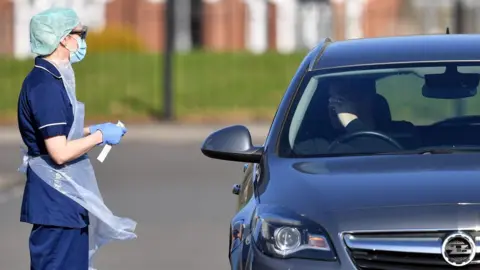Coronavirus: Testing falls short of 100,000 daily target
 PAUL ELLIS
PAUL ELLISTesting for coronavirus fell sharply on Saturday, days after Health Secretary Matt Hancock said the government had met its daily target of 100,000 tests.
In the past 24 hours, ministers said just under 76,500 tests were carried out, a drop of more than a third on the 122,000 tests carried out on 30 April.
NHS England medical director Prof Stephen Powis acknowledged that testing had taken a "little bit of a dip".
On Friday Mr Hancock described the 100,000 target as "audacious".
The health secretary set the goal on 2 April, when the UK was on 10,000 tests a day.
Announcing the government's success, Mr Hancock suggested the 100,000 goal had a "galvanising effect", adding that the bolstered testing capacity would "help us to unlock the lockdown".
However, the government came in for criticism for including 40,000 tests which were dispatched by post and may not have been taken.
Since then, the number of tests has dropped by about 40,000, according to official statistics.

- A SIMPLE GUIDE: How do I protect myself?
- AVOIDING CONTACT: The rules on self-isolation and exercise
- HOW A VIRUS SPREADS: An explanation
- LOOK-UP TOOL: Check cases in your area
- TESTING: Can I get tested for coronavirus?

At the Downing Street briefing on Sunday, cabinet minister Michael Gove praised Mr Hancock's "amazing achievement" in reaching his target.
Mr Gove said the massive increase in tests had been an example of what "the public sector and the private sector working together under a very strong political leadership can achieve".
He said the dip in the number of tests was due to the fact that fewer people were at work over the weekend.
"Thanks to the hard work of so many across the NHS, Public Health England, our pharmaceutical sector and our universities, we have tested over 200,000 key workers and their families, allowing those who don't have the virus to go back to work and protecting those who do."
Also speaking at the briefing, Prof Powis said testing capacity "had ramped up very quickly".
"We are now at a very high level of testing, over 100,000 - a little bit of a dip in the weekend - but we anticipate that that testing capacity will continue to increase," he said.
Dr Elisabetta Groppelli, a lecturer in global health at St George's, University of London, said 76,500 was still a "fantastic number" and that the UK was "becoming comparable" to countries with similar population sizes.
"What is important is that the UK has steadily increased the number of tests that have been performed," she said.
Testing was expanded in England last week to millions more people with symptoms including over-65s, those who have to leave home to work, and people living with someone in these groups.
In Scotland, First Minister Nicola Sturgeon announced earlier that testing would be expanded to over-65s with symptoms and also all those in care homes where there had been an outbreak.
And on Friday, the Welsh government extended coronavirus testing to people in care homes even if they are not showing symptoms of the disease.
The UK government is hoping the enhanced testing regime, alongside contact tracing and continued social distancing, can stay on top of transmission rates and prevent a second wave of infection.
A "comprehensive" road map on a gradual easing of lockdown measures is expected at the end of next week.
A total of 28,446 people have now died with coronavirus across the UK.
That number includes deaths in hospitals, care homes and the community, but only for those who have tested positive for Covid-19.
